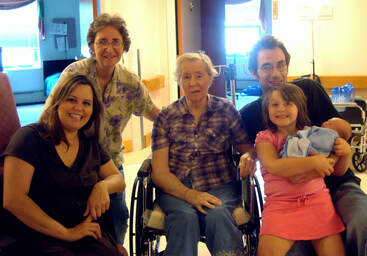|
This is a tough topic to address although they're all tough to a certain degree. I haven't always been successful myself with this delicate dance of grandparenting. As an older adult who has made lots of mistakes and hopefully learned from most of them, I have a lot of advice to give. However, it's not always welcome, and I haven't always recognized that. Parenting is the toughest job there is and often doesn't get its due from non-parents. Grandparenting is supposed to be the easiest and most wonderful follow-up to that, and it usually is. However, it is very hard to watch your adult children make mistakes, especially when they could have been avoided. My rule for myself now is to either wait until asked or ask first if they'd like to know what I think. If they say no, I respect that but might try again later depending on how important I think it is. New parents often feel defensive about their parenting skills. I know I did. We don't know what we're doing and worry that we'll do it all wrong. However, we also need to feel in charge and make our own mistakes. So, how do we find that balance? Elders are an important source of information. We don't have all the answers but we probably have a lot. As for me, I nursed three of my own babies, had hospital births and homebirths, sent my children to public school, private alternative school and homeschooled them. I dealt with food allergies and too many illnesses to name here, including accidents that needed stitches. I learned how to do my own butterflies on wounds when we had no health insurance and studied herbology and natural healing. I made my own babyfood and dealt with sleep issues, discipline and more. My children were all different with their own set of issues, so I've had to learn a lot over the years. When my children were teens and adults, I faced more issues than most people ever have to deal with and know how to navigate multiple "systems." Basically and unfortunately, I am a font of knowledge. That is what the role of elders is supposed to be. We are fonts of knowledge. If one elder doesn't know the answer, another one will, and most of us want to help out. We want to be asked. In previous generations, elders lived with or close by their children giving assistance and guidance. Often the elders raised the kids. Most of us are really good at it and have much more patience. We see things differently as we age. That different perspective is very valuable and, let's face it, we want to feel valued as we age. We're not ready to be thrown out and discounted. Many of us are in the prime of our lives. So let's move on to the parents. As a parent, the last thing we want is to be told we're doing something wrong. We're doing the best we can and are obviously bound to make mistakes. Who wants that shoved in their face? Grandparents need to let parents make those mistakes so that they learn. When they do make those mistakes, it's important that we not say, "I told you so," or "If you'd only listened to me..." What grandparents need to do then is listen and comfort their hurting child. It's not easy to face our mistakes but an important part of the process. If we want our children to come to us in times of stress or times of need, we need to be compassionate and loving even if we would have done things differently. The more supportive we are instead of being critical, the more likely they will come seeking advice when they need it. However, parents do need to remember to ask for help, too. Ultimately, there is no magic answer to any of this. Like I said, parenting is the hardest job, and it doesn't get easier when your children have children of their own. But the best course, in my opinion, is for grandparents to hold their tongue and for parents to seek out their parents' learned knowledge. Although my own mother and I didn't get along well, I often turned to her for parenting advice. We can all work together as a team. It really does take a village to raise a child.
0 Comments
Your comment will be posted after it is approved.
Leave a Reply. |
Archives
April 2019
Categories |


 RSS Feed
RSS Feed